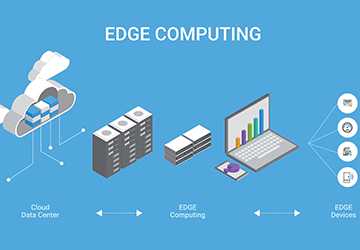It's important to realise that edge computing, as explained by this technology paradigm, moves processing and data storage closer to the point of demand instead of depending exclusively on a centralised cloud-based system. Edge computing facilitates local data processing and analysis, increasing speed and lowering latency. By bringing computation to the "edge" — closer to where computing needs to happen — this approach minimises the strain on data centres and reduces the time and resources used to transport data across long distances.

The Importance of Edge Computing cannot be overstated in today's rapidly evolving digital landscape. The sheer volume of data created by devices will increase dramatically as the Internet of Things (IoT) expands. Edge computing is being promoted as a method for efficiently handling this tremendous inflow of data. Processing data locally on the device or in a nearby server allows for real-time data processing without latency, which is crucial in applications like autonomous driving, industrial IoT, and healthcare monitoring systems.
The contrast between Edge and Cloud Computing is a frequent source of misunderstanding.
While both are methods of managing data and applications, the critical difference lies in where the processing occurs. Cloud computing relies on centralised servers in data centres to perform all processing tasks, which may cause delays or latency when transmitting data back and forth. Edge computing, on the other hand, distributes the computational load, allowing for localised decision-making. It is particularly beneficial for real-time applications without lag, such as emergency response systems or real-time analytics in financial markets.
One of the less-talked-about aspects of Edge Computing Explained is the security dimension. Because edge computing moves computation closer to the end-users and devices, it inherently exposes more points of vulnerability. However, it also offers the opportunity for more robust security protocols because data can be anonymised and encrypted locally before being sent to centralised data centres. This dual nature makes the security aspect of edge computing a critical area for ongoing research and development.
The Importance of Edge Computing will grow as technologies like 5G become more prevalent. With faster networks, the ability to process and analyse data in real-time will become a possibility and an expectation. Companies investing in edge computing today will likely find themselves in an advantageous position, ready to quickly leverage the immense benefits of real-time data processing and analytics.
When we talk about Edge Computing, one of the significant advantages that companies should not overlook is cost efficiency. The need for large bandwidth to transfer data to a central server is reduced by processing data closer to where it originates; this is critical in reducing operational costs, especially for companies that deal with high volumes of data or operate in multiple locations. Furthermore, this also decreases latency, thereby enhancing the user experience. These variables combine to make edge computing a financial game-changer for firms looking to reduce costs.
Data privacy and compliance have become increasingly important in the digital age, especially with the introduction of regulations like the GDPR in Europe. Edge Computing provides a robust solution to these complex and often challenging legal requirements. Local processing and data storage make it easier to comply with regional data protection laws; this reduces legal risk and fortifies a company's reputation as a secure and responsible data handler.
Scalability is an essential factor that every business, regardless of size, should consider. Traditional cloud-based or centralised architectures may require significant, upfront capital investments to scale up. In contrast, Edge Computing allows for incremental scalability. As your business needs grow, you can add more local devices or edge servers without a significant investment, making it an economically viable option. This level of modularity enables businesses to remain agile in a rapidly evolving digital landscape.

The environmental impact of data centres has become a growing concern. Edge computing provides an environmentally friendly option by needing smaller, more localised data centres that use less energy for cooling and maintenance; this lowers the overall carbon footprint and aligns well with the global push toward sustainability. As environmental responsibility becomes a corporate priority, this feature only adds to the attractiveness of implementing edge computing solutions.
Applications for edge computing are helpful in many industries, including manufacturing and retail. Real-time data analytics made possible by edge computing can significantly increase operational efficiency in the manufacturing sector; this reduces expenses and might prevent expensive downtime by anticipating machinery breakdowns before they occur. Edge computing can improve the shopping experience for customers in the retail industry by providing features like automated checkouts, real-time inventory tracking, and customer behaviour research.
The Internet of Things (IoT) has become a buzzword in the digital era. Many people must know how well IoT and edge computing complement one another. Large volumes of data are produced by IoT devices, frequently in real-time. Moving this data to a central server for processing can take time and money. These devices can process data locally thanks to edge computing, which decreases latency and expedites decision-making; this has the potential to improve system responsiveness in industrial IoT sensor configurations significantly.
When discussing Edge Computing, it's vital to talk about interoperability, which refers to the ability of diverse systems and organisations to work together. For Edge Computing to be genuinely practical, devices from different manufacturers should be able to communicate seamlessly; this is particularly important in industrial setups where multiple types may be used. Companies should look for edge computing solutions that adhere to these standards. As Edge Computing gains traction, ethical considerations also come into play.